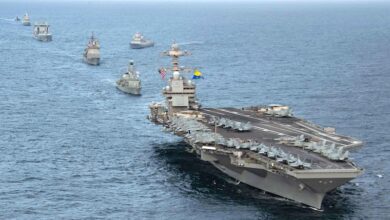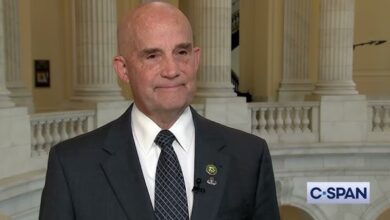This week President Trump came under fire from the media for statements he made about Islamic terrorists being arrested by Central American countries. The news came as a group of migrants swelled to 14,000 as they travel north to the United States.
Individuals from the Middle East have in fact been arrested at the U.S. Border in the past. The media has decried Trump’s remarks this week as “lacking evidence” and chosen not to investigate the claim.
The media has chosen not to talk with Guatemalan President Morales who made the startling admission saying he has shared the classified information with American authorities including the CIA.
Department of Homeland Security (DHS) has backed up Trump’s statements, asserting that citizens from countries including the Middle East were indeed “traveling through Mexico towards the U.S.”

DHS spokesperson Tyler Q. Houlton took to Twitter to suggest in a thread that there are indeed “citizens of countries outside Central America, including countries in the Middle East…currently traveling through Mexico toward the U.S.”
“@DHSgov can confirm that there are individuals within the caravan who are gang members or have significant criminal histories,” Houlton wrote, before adding in a second tweet: “Citizens of countries outside Central America, including countries in the Middle East, Africa, South Asia and elsewhere are currently traveling through Mexico toward the U.S.”
Houlton said in a third tweet: “Stopping the caravan is not just about national security or preventing crime, it is also about national sovereignty and the rule of law. Those who seek to come to America must do so the right and legal way.”
One of our goals is to provide the text of speeches which serve to provide information that is unfiltered by the national news media. Below are the remarks of the Guatemalan President and his statements (which we have bolded) about the terrorists they have rounded up and deported. This should serve as another example of American news media ignoring, or worse, contradicting the facts purely for political means.
The following remarks were made at the Conference on Prosperity and Security in Central America on October 11.
SECRETARY POMPEO: Thank you very much. President Morales of Guatemala, we welcome your remarks.
PRESIDENT MORALES: (Via interpreter) Thank you very much. Good morning. Mr. Vice President Pence; Mr. Juan Orlando Hernandez, president of Honduras; Mr. Ortiz, vice president of El Salvador; Mr. Videgaray, foreign affairs minister of Mexico; Secretary Nielsen, Secretary for national security and the Homeland Security in the United States of America, everyone, good morning.
We echo this mention of solidarity, given the disasters caused by Hurricane Mike, and if we can be of help as friendly nation, please take us into account. It will be our privilege. We also would like to express solidarity with the countries that have suffered rains and floods in the region with these landslides. We are also at your disposal, if we can be of help to you.
With regards to the last conversation we had in Guatemala, one of our commitments had to do with carrying out awareness-raising campaigns to prevent irregular emigration of Guatemalans, who’d be endangering their lives trying to come looking for opportunities in the United States. I’d like to thank the recognition of the leadership the first lady, my wife, has assumed carrying out different activities with many institutions to raise awareness that most of Guatemalan population to that effect.
The three issues discussed at that meeting had to do with migration, prosperity and work, drug trafficking and border security. In the case of the fight against drug trafficking, DEA, the ambassador before the United Nations, Nikki Haley, and also INL and other organizations, investigation organization of the United States, say that Guatemala is the main ally in the region in the fight against drug trafficking.
I have information I will share with you, information provided by these institutions in the United States. In two years and a half, we have exceeded the seizures of drugs of 12 years in the past. This is truly unprecedented. We also have information from the Southern Command saying that the Pacific in Guatemala, over 200 nautical miles, have gone down from 45 to 15 percent with regards to the transport of drugs, and our 200 nautical miles are free. And we have been working in joint operations with Colombia, Mexico, the United States, and Guatemala so that the 400 nautical miles in the Pacific in Guatemala become an impossible place for those trying to transport drugs. We have five boats that have been donated by the United States with autonomous capacity for 200 nautical miles only. We have already covered 300 nautical miles, exceeding thus 50 percent of their autonomy level. I’d like to thank my naval forces and my police officers who have been working in an exemplary fashion.
Of course, there are many more pieces of data we will share with you, but we’d like them to be considered when we discuss our fight against drug trafficking and the issue of security. We undertook a commitment so as to become certified by the United States. Whenever we have complied with requests, the United States has changed the conditions. For us, this has been complicated with regards to the Alliance for Prosperity. We made a commitment to remove the army from the patrol duties on the street. For many years we were not able to do so, but we did that in a year and a half. We were able to remove the army from patrol duties. This does not mean our land has no protection. What we did was increase the civilian police forces: 4,000 in 2016 and 2017, 4,000 in 2018 – excuse me, 18 – 8,000 between 2016 and ’17 and 4,000 in 2018. This means that today we have over 40,000 civilian national police members protecting the country, and the army has been taken to the borders so as to be able to strengthen our binational forces in the groups – work groups we have with Mexico, El Salvador, Honduras, and which will soon increase with Belize as well.
With regards to the fight against criminal organizations, in 2018 and 2017 we were able to capture 1,250 gang members from gangs Mara Salvatrucha and Barrio 18, thus disarticulating about 150 criminal structures that were taking part in extortion, murder, and kidnappings. All of this has been done with information we’ve been sharing in our joint work in the Northern Triangle.
In 2009 we were one of the most dangerous countries, with a murder rate of 49 murders per 100,000 inhabitants. By 2015 we were able to reduce this to 30 murders per 100,000 inhabitants. During my government, 2016, 2017, and 2018, we have been able to reduce this rate to 22.9 murders per 100,000 inhabitants, bearing in mind that in Latin America the average is 23.5 percent per 100,000 inhabitants. We were able to achieve this working on internal security, on the strengthening of our borders, and of course, the fight against drug trafficking, which we all know carries with it destruction and death.
As Foreign Affairs Minister Videgaray said, one of the problems we have faced is not only the issue of production in the south for consumption in the north, we are also seeing the same production in the center and also consumption in the center. We have eradicated 417 million plants of poppy last year. Just with this eradication, this equals $1.4 billion which would have – due to heroin production which would then be taken to the markets that consume it. This has strengthened the second issue, which has to do with the strengthening of our borders, because in our borders – that used to be and continue to be highly porous – is where we are being able to find this kind of problem.
There is another issue I’d like to mention. We have arrested almost 100 people highly linked to terrorist groups, specifically ISIS. We have not only detained them in our territory, they have also been deported to their countries of origin. All of you here have information to that effect.
With regards to prosperity, we’ve worked hard for the transparency and integrity of our administration – will allow us to make savings and appropriate investments in the country. We have been congratulated and we have increased 26 places in the Open Government Initiative, an initiative pushed by the United States itself through its own open government policy. We also worked with the Organization of American States to provide information to that effect. We also worked with the OECD based in Europe, on which deals with transparency matters. And the day before yesterday, we were accepted for accession to a study so as to become one of the countries that meets all of the necessary transparency indices and governance on accountability indices.
Always, on the issue of transparency and public administration, I do not know whether you have heard here about ISO certifications. ISO certifications are based in Mexico. They provide quality certifications. Their best-known standard is ISO-9001. Both public and private enterprises can be certified according to their level of quality. The General Secretariat, this is the secretariat of the president’s office, was certified with standard ISO-9001 and also with ISO-37001. This is the only presidential office to attain this certification. Not even the United States or any capital in Europe has it. This is the certification that has to do with the fight against bribery, certification 37001. With this, I am trying to convey that the president’s office of Guatemala can humbly tell you that if someone is leading the fight against corruption in Guatemala, it’s the president’s office.
We have some problems and we’d like to put them on the table. We’ve suffered international interference that has taken over our courts of justice. The fact that they have – had power now in courts have deprived us from the possibility of working as president’s office, and they are – that’s also affecting you. The main court in my country is the constitutional court. The constitutional court has infringed the political constitution of the republic, and it has also gone against the Vienna Convention. I said so at my speech in the UN. Judges and magistrates have been appointed who have made decisions against the government and against companies and American capital. And allow me to share an example. There’s a mine, San Rafael mine, 60 percent American – 60 percent Canadian capital, 40 percent American capital. Five hundred days with work stoppage, having invested $1 billion on the mine. This company has lost over 35 percent of the value of its shares of the stock market in the United States. This because there has been interference. This mine can also provide you information.
The information has been provided through your senators about the fact that they have stopped hiring about 2,500 individuals. They already have photographs of people who haven’t had jobs at that mine, have had to come to the United States to look for jobs. There is a survey: Out of 2,500 people, 75 are already thinking about migrating to the United States. One question: Who has interfered in our courts? I’ve already said so a year and a half. Mr. Guterres, the secretary-general of the United Nations, did not listen to us. He didn’t understand that interference in other courts through CICIG and other international powers, this can break down the economy of a country.
Finally, I can guarantee to you that with validated indicators, validated by American institutions, our security indicators, our indicators on the quality of our expenditure, the fight against drug trafficking, the fight against terrorism, and the fight against all of the threats that endanger our region. And as I said before, Guatemala by plane is closer than Washington than Los Angeles is to Washington, and for us this is very important, and it represents an opportunity, an opportunity of closeness, of work and cooperation.
Allow me to conclude by saying that we, the plan of the Alliance for Prosperity of our budget in the last – in the two years and a half I’ve been in office, we have invested about 15 billion quetzales. This equals $2 billion. This is what we have invested, based on the priorities set by the United States Department of State, focusing on the areas where there was the greatest migration of individuals. To do so, I had to not consider as priorities 17 departments – that is to say, almost 75 percent of my territory, so as to comply with the Alliance for Prosperity plan.
So far, we have not received a cent. We had – 50 percent has been approved and from the United States, we have heard that maybe they will not certify the remaining 50 percent. Humbly, respectfully, we’d like to make a different proposal, a simple proposal. We think we are an excellent ally of the United States and we want to be even better. We’d welcome your helping us have institutions such as the IDB or the World Bank or other financial institutions giving us $15 billion for infrastructure projects. In the next 30 years, we could pay the interest of that capital.
Having all of the transparency elements necessary for investments on roads, infrastructure, courts, to strengthen our borders as well – this is a project we have had with Mexico. Mexico was able to do so. We were not able to invest in infrastructure in our border areas, but if we had access to credit, with credits we can actually repay, and with all of the possibilities for investments to be done in a transparent fashion, we’d be the first ones to be interested in strengthening the south of the United States and the north of Central America.
So as to conclude, big projects, such as the ones we’ve done with Honduras in a customs union that has been unprecedented, joining the north of Central America, uniting it with El Salvador, and the possibility of having through that investments – this will give us jobs and allow us to strengthen our security. We are always at your disposal to provide service. We want to be your best allies in the region.








